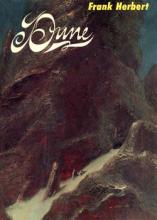Dune - Frank Herbert

I enjoyed Dune. It's good to read a classic, especially one that so dramatically influenced a genre -- in Dune's case, popularizing hard science fiction.
There were some awkward bits of the writing style. Things moved a bit slowly sometimes, and there were some awkward shifts in point of view.
Before starting Dune, I actually read Calvin and Muad'Dib (Calvin and Hobbes comics with Dune quotes for the text). That comic has some very interesting and provocative quotes from Dune. However, in comic form, those quotes are much closer together than in the actual book.
One of the major themes of the book is of order versus chaos. Most of the structures in the book -- religion, the space guild, the political Bene Geserrits, the governmental orders -- are made out to be less than virtuous. Even when well intentioned, those organizations use manipulation to achieve their ends, and those organizations don't seem to be predominantly well intentioned in any case. Duke Leto provides a bit of a counterpoint, but the book focuses more on Paul than his father.
While the book doesn't paint structure in a favorable light, it also doesn't seem to like chaos very much. Paul rises up against unjust orders, but he also experiences a fall from grace. The book constantly plays the Paul of the end of the book against the Paul of the beginning of the book, and readers aren't made to like what they see. The uprising that Paul has against unjust order is based on manipulation and doesn't respect the sanctity of human life. In some senses, it seems like Paul becomes an unjust order of his own. Given that someone who was spending most of his energy fighting that very thing, Dune seems to make it seem like unjust order is inevitable.
However, at the same time as the plot is advancing the notion that unjust order is inevitable, the rhetoric of the book advances the opposing notion that the world is an intrinsically chaotic place, that order never lasts, and that order is only a slow stagnation. This rhetoric comes from multiple sources and is not generally presented in a critical light, so it doesn't seem like the reader is meant to distrust this side of things either.
In other words, even though the arc of the plot is, at a high level, one of progress, the book seems to be sending the message that order and chaos are each inevitable and that neither one is virtuous. In Dune, is there no room for hope?



